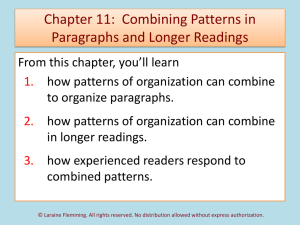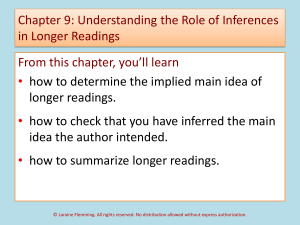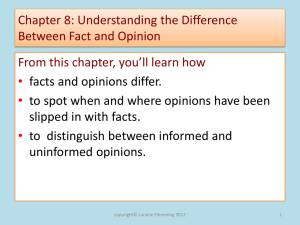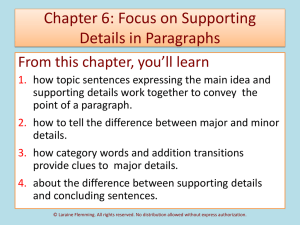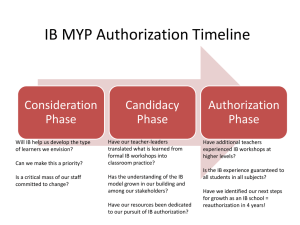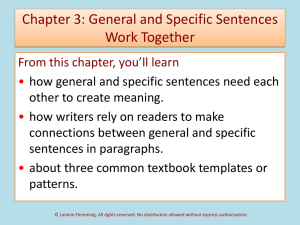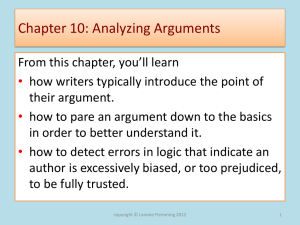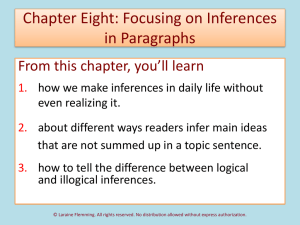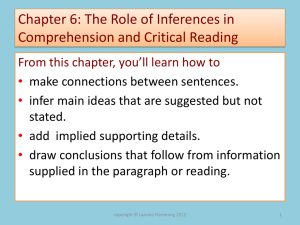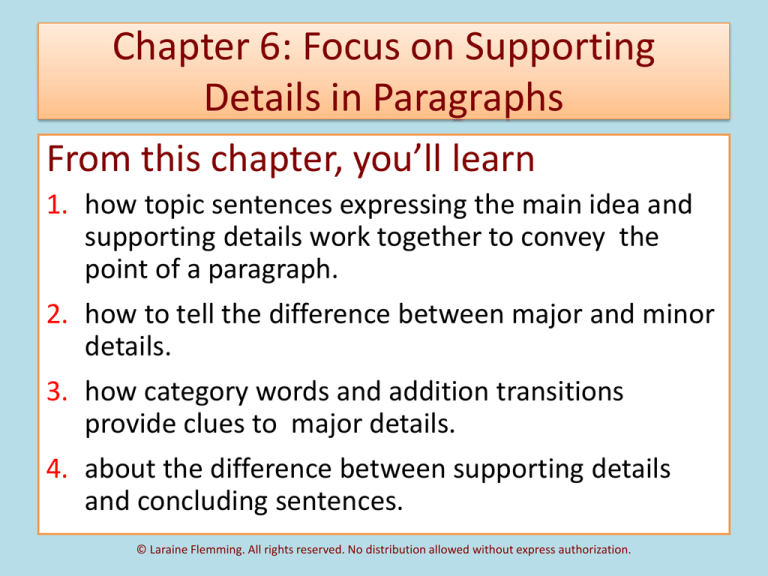
Chapter 6: Focus on Supporting
Details in Paragraphs
From this chapter, you’ll learn
1. how topic sentences expressing the main idea and
supporting details work together to convey the
point of a paragraph.
2. how to tell the difference between major and minor
details.
3. how category words and addition transitions
provide clues to major details.
4. about the difference between supporting details
and concluding sentences.
© Laraine Flemming. All rights reserved. No distribution allowed without express authorization.
Supporting Details
• are specific sentences that explain, prove, or
suggest the main idea.
• can be reasons, illustrations, statistics,
definitions, etc.
• change according to the main idea they explain,
convince, or imply.
• clarify key terms and prove the author’s point.
• answer questions raised by the main idea
expressed in the topic sentence.
© Laraine Flemming. All rights reserved. No distribution allowed without express authorization.
Connecting Main Ideas and Supporting Details
Topic Sentences Expressing the Main Idea
• use general language.
• make statements that raise questions.
Supporting Details
• place limits on how the general language can
be understood.
• answer questions raised by the topic
sentence.
© Laraine Flemming. All rights reserved. No distribution allowed without express authorization.
Topic Sentences Expressing the Main Idea are Bound to
Raise Questions.
Topic Sentence:
Lyndon Johnson, the thirty-sixth president of the
United States, did much good and even more
harm during his term in office.
Questions raised:
1. How did Johnson do good?
2. How did he do harm?
3. How is it possible to do both at the same time?
© Laraine Flemming. All rights reserved. No distribution allowed without express authorization.
These Four Supporting Details Answer The
Three Questions.
1. Johnson was responsible for the Civil Rights Act of
1964 and the Voting Rights Act of 1965.
2. Thanks to Lyndon Johnson, those over the age of
sixty-five now have federally funded medical
assistance in the form of Medicare.
3. Yet, although all the signs were there that the
Vietnam War was disastrous for the United States
and for Vietnam, Johnson kept the war going.
4. His stubborn determination in the face of
guaranteed failure cost immeasurable suffering.
© Laraine Flemming. All rights reserved. No distribution allowed without express authorization.
Spot Check: Recognizing Major Details
• If this is the topic sentence—“Although a 1995
landmark conference in Beijing China, called
for equality for women around the world,
many women all over the globe still do not
have equality with men”—which one of the
following sentences could be a major detail
that helps explain that point?
© Laraine Flemming. All rights reserved. No distribution allowed without express authorization.
Spot Check: Recognizing Major Details
a. Iceland’s Vigdís Finnbogadóttir was the first woman
to become a democratically elected head of state.
b. In Tunisia, during the Arab protests of 2011, women
played a critical role in the uprising against dictator
Zine El Abidine Ben Ali .
c. In parts of Pakistan where the Taliban still hold
sway, women must adhere to strict rules of
modesty and keep their faces covered for fear of
being punished by men they do not even know.
© Laraine Flemming. All rights reserved. No distribution allowed without express authorization.
© Ulrich Flemming
In some parts of the world, women don’t dare
show their faces in public for fear of reprisal.
© Laraine Flemming. All rights reserved. No distribution allowed without express authorization.
There are two kinds of supporting details, major and
minor.
Major Details
• refer directly to the main idea expressed in the
topic sentence.
• clarify or prove some part of the topic
sentence.
Minor Details
• follow and further develop major details.
• are the most specific sentences in the paragraph.
• add human interest or repetition for emphasis.
© Laraine Flemming. All rights reserved. No distribution allowed without express authorization.
Major and Minor Details Work
Together to Develop the Main Idea
If diagrammed, the topic sentence along with
major and minor details, would look something like the ladder diagram that follows:
© Laraine Flemming. All rights reserved. No distribution allowed without express authorization.
5.2
Diagram of Major and Minor
Details with Topic Sentence
Main idea: Most people don’t realize that the holiday we call
Labor Day began under very sad circumstances.
Major Detail: Labor Day got its start when
President Grover Cleveland sent troops to break
up a railroad workers’ strike, and many striking
workers were injured; the strike was broken but
the public was angry.
Note the
importance of the
“minor detail.”
Minor Detail: To calm the public’s
outrage, Congress rushed the
national holiday, called “Labor Day,”
into law.
© Laraine Flemming. All rights reserved. No distribution allowed without express authorization.
© Ulrich Flemming
A Word to the Wise
Don’t be misled by the words major and
minor. Minor details can add important
information as they do in the previous
example. While some add just emphasis or
repetition, others provide key details.
Always evaluate the minor details.
© Laraine Flemming. All rights reserved. No distribution allowed without express authorization.
Can you separate the topic sentence from
the major and minor details?
1. The e-mail usually includes quotations from the
Bible and a request for money.
2. With this scam, the target receives an e-mail
from someone, supposedly a foreigner, who
wants to spread the word of God but needs
financial help because of illness, age, or
government interference.
3. One especially popular Internet scam targets
people of the Christian faith.
© Laraine Flemming. All rights reserved. No distribution allowed without express authorization.
Topic Sentences with Category Words Offer Clues to
Major Details
Category Words
• sum up and generally refer to a number of more
specific activities, events, and behaviors.
• are words like characteristics, studies, styles,
similarities, and practices.
• point the way to major details, which define each
characteristic, study, style, similarity, and practice,
etc., referred to the topic sentence.
© Laraine Flemming. All rights reserved. No distribution allowed without express authorization.
Which Topic Sentence Provides a Category
Word Clue to the Major Details?
• The American painter Jackson Pollock (1912-1956) became
a superstar in the art world practically overnight, after his
picture appeared in a 1949 issue of Life magazine.
• History has not been kind to John C. Calhoun (1782-1850),
the former vice-president and senator from North Carolina.
• Early in the twentieth century, the Supreme Court’s rulings
in a number of key cases put some teeth into the
Constitution’s guarantee of free speech.
© Laraine Flemming. All rights reserved. No distribution allowed without express authorization.
Recognizing Major Details
The correct answer is the third sentence:
“Early in the twentieth century, the Supreme
Court’s rulings in a number of key cases put
teeth into the Constitution’s guarantee of
free speech.”
• The topic sentence announces to readers that
each ruling or case will be a major detail.
© Laraine Flemming. All rights reserved. No distribution allowed without express authorization.
Write Down this Topic Sentence
• Worried about the gender imbalance in the
population, with males outnumbering females
to an alarming degree, the Chinese
government has begun to introduce measures
designed to improve the culture’s view of
women’s importance.
What’s the category word and which of the
following flesh that word out?
© Laraine Flemming. All rights reserved. No distribution allowed without express authorization.
Recognizing Major Details
Which two sentences would be major details in
relation to the previous statement?
1. The government has begun offering bonuses to
families with more than one female child.
2. The government has also changed inheritance laws
making it easier for daughters to inherit family
property.
3. The bonuses are not large but they are an incentive
meant to discourage the aborting of females, a
practice that has contributed to the decline in the
female population.
© Laraine Flemming. All rights reserved. No distribution allowed without express authorization.
The Role of Addition Transitions
Although they are not as reliable as the topic
sentences just covered, transitions are also
clues to major details.
• Transitions like next, first, second, and
finally frequently introduce major details.
• In effect, they say to readers, “Here’s
another one. Pay attention.”
© Laraine Flemming. All rights reserved. No distribution allowed without express authorization.
Concluding Sentences
• as their name implies, come at the end of
paragraphs.
• explain how some problem or situation
was resolved or should be resolved.
• don’t directly support the main idea.
• can still contain significant information.
© Laraine Flemming. All rights reserved. No distribution allowed without express authorization.
Does this paragraph end with a concluding sentence or a
supporting detail?
John Lewis, Georgia’s long-time congressional representative, risked
his life to win equality for himself and his fellow African-Americans.
In 1965, Lewis was a young and passionate civil rights activist, who
participated in the march over Selma, Alabama’s Edmund Pettus
bridge in order to win the right to vote. The marchers were met by
police armed with clubs and snarling dogs. Lewis and 90 other
demonstrators were badly hurt. But the violence against the
demonstrators, which ended up being televised, outraged the public
and increased support for African-American civil rights. Twenty-three
years later, when Barack Obama was inaugurated, Lewis said,
“Barack Obama is what comes at the end of that bridge in Selma.”
© Laraine Flemming. All rights reserved. No distribution allowed without express authorization.
© Ulrich Flemming
Finishing Up: Focusing on Supporting
Details in Paragraphs
You’ve previewed the major
concepts and skills introduced in
Chapter 6. Take this quick quiz to
test your mastery of those skills
and concepts, and you are ready to
read the chapter.
© Laraine Flemming. All rights reserved. No distribution allowed without express authorization.
Finishing Up: Focusing on Supporting Details in
Paragraphs
1. In the the following topic sentence, what
words would you expect the major
details to further develop: “Giacomo
Rizzolatti of Italy’s University of Parma
has done some very interesting research
on mirror neurons.”
© Laraine Flemming. All rights reserved. No distribution allowed without express authorization.
Finishing Up: Focusing on Supporting Details in
Paragraphs
• The most obvious phrase to be addressed by the major
supporting details is “mirror neurons.”
• “Rizzolatti’s interesting research” would also require
some explanation. Readers would want to know why
the research is “interesting.”
• Without a definition of mirror neurons and an
explanation of the research, the topic sentence would
raise expectations in the reader that go unanswered.
© Laraine Flemming. All rights reserved. No distribution allowed without express authorization.
What’s the topic sentence of this paragraph, and is the
last sentence a supporting detail or a concluding
sentence?
2. Up until the 16th century, people believed that Earth
was the center of the universe. But in 1543, Nicholas
Copernicus, a Polish scientist, challenged that world
view. In his book Concerning the Revolutions of the
Heavenly Bodies, Copernicus argued that the earth
actually revolved around the sun. His theory
challenged the existing belief that the sun revolved
around Earth. Although he waited until he was about
to die to publish his ideas, Copernicus still suffered
from the critical response to his work, which was
condemned by the Catholic Church.
© Laraine Flemming. All rights reserved. No distribution allowed without express authorization.
What’s the topic sentence of this paragraph, and is the
last sentence a supporting detail or a concluding
sentence?
3. The Prohibition laws of the 1920s, which made
drinking liquor illegal, actually caused rather hindered
illegal activity. Nationwide, Americans showed nothing
but contempt for the laws. Attempts to enforce it
were met with hostility. Worst of all, control of liquor
distribution fell into the hands of organized crime, and
gang members routinely killed one another over the
right to distribute liquor. In 1933, the Twenty-first
Amendment to the Constitution, formally put an end
to Prohibition laws.
© Laraine Flemming. All rights reserved. No distribution allowed without express authorization.
© Ulrich Flemming
Brain Teaser Challenge
© Laraine Flemming. All rights reserved. No distribution allowed without express authorization.
Brain Teaser Challenge
Read the following four quotations. Then decide
which more general main idea they illustrate.
a. “I don’t care if a dude is purple with green
breath as long as he can swing.”
(Miles Davis)
b. “So what if we’re Asian. Listen to the flow of our
rhyme, and you’ll forget what color we are.”
(Chops, former member of the Asian-American rap group, Mountain Brothers)
© Laraine Flemming. All rights reserved. No distribution allowed without express authorization.
Brain Teaser Challenge
c.
Long before the Civil Rights Act, long before Brown
vs. The Board of Education, and long before
President Truman’s integration of the armed forces,
black and white musicians were breaking social
taboos to learn from each other.
(Jeff Perry, diversity trainer)
d. “I don’t care if he’s purple [referring to white
rapper Eminem], as long as he can rap!”
(Dr. Dre)
© Laraine Flemming. All rights reserved. No distribution allowed without express authorization.
The four quotes about music and musicians
provide support for which of these more general
statements?
1. Music of all the arts has the most influence on the
passions. (Napoleon Bonaparte)
2. If music be the food of love, play on. (Shakespeare)
3. Music is the universal language of mankind. (Henry
Wadsworth Longfellow)
4. I don’t know anything about music. In my line, you
don’t have to. (Elvis Presley)
© Laraine Flemming. All rights reserved. No distribution allowed without express authorization.

